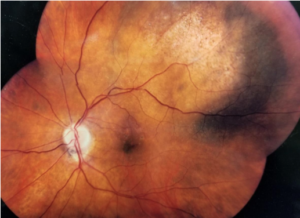Dr. Frankel’s Case of the Week: Why a Dilated Eye Exam is Important
24-year-old female presents to the office for redness and irritation OU x a few days. She trialed using artificial tears with no improvement. She had no visual complaints. Entering best-corrected visual acuity was 20/20 OU and intraocular pressure was 15 OD and 16 OS. She deferred dilation because she didn’t want her vision to be blurry when she left. We kindly recommended that we dilated as we dilate all our new patients, she agreed. Anterior segment exam revealed 1+2+ injection OU with a moderate papillary reaction. There was significant mucus discharge and no positive preauricular node on either side. Posterior segment exam revealed normal fundus appearance in the right eye and a large melanotic neoplasm along the superior arcade, with subretinal fluid and overlying vessels in the left eye.

What is the most likely diagnosis?
The patient was sent to ocular oncology for an ocular melanoma of the left eye. This is the most common primary intraocular malignancy in adults. It is described as a focal, pigmented or nonpigmented, dome/collar button-shaped lesion; usually with overlying serous retinal detachments. These patients are often asymptomatic or may complain of flashing lights or blurred vision in the periphery (rarely centrally). Most patients are middle-aged or older and Caucasian. Characteristics that leave a patient at high risk for a melanoma are lipofuscin, lesion height of greater than 3 mm, subretinal fluid, overlying vasculature and close proximity to the optic nerve. These are diagnosed with dilated examination and B scan ultrasound imaging. Patients that are diagnosed with ocular melanoma can go on to acquire metastatic disease (25% in 5 years and 34% in 10 years). If the cancer does metastasize; the liver is effected 89% of the time. The mortality rate after metastatic disease in 80% in 1 year and 92% in 2 years. This is an excellent example as to why it is important to get your eyes dilated every year!
To have your eyes dilated and to check for any major ocular diseases, make an appointment with Dr. Frankel. Give our office a call or simply schedule an appointment via ZocDoc.
On social media? Like us on Facebook & Follow us on Twitter
